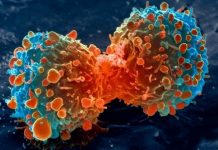 Hi Friends!! You might be wondering what cancer stages are all about.
Hi Friends!! You might be wondering what cancer stages are all about.
This for your information that cancer does not develop all of a sudden.
It slowly and gradually develops in the body either showing symptoms or being asymptomatic at early cancer stage.
Changes are must!! Several changes must occur in the genetic information or the DNA.
These changes are carried in a single cell before it can become a cancer cell and multiply into a tumor.
Cells change their abnormal growth properties one step at a time. Please note that not all cells acquire the same genetic changes nor can anyone predict when the changes will occur.
That explains to some extent why some other cancers may grow so slowly that the person eventually dies from a cause other than cancer and some cancers develop and grow rapidly and cause death in just few months.
Staging! This can be defined as allotting a cancer stage depending on its type and spread. Cancer staging systems describe how far the disease has spread anatomically.
Depending on these cancer stages an attempt to put patients with similar prognosis and treatment in the same staging group is made. Since prognosis and treatment depend quite a bit on the stage, it is quiet evident that how important it is to know the cancer stage of the patient!
Other factors, such as general health, patient preference, and the results of biochemical tests contribute to determining the prognosis and treatment. It should be noted that while the stage is important it is not everything.
The concept of stage is applicable to almost all cancers except for most forms of leukemia. Since leukemia’s involve all of the blood, they are not anatomically localized like other cancers, so the concept of staging doesn’t make as much sense for them.
Now that you have come to know what staging is let’s look into what are the cancer stages?
- In stage I, cancer cells can be distinguished from normal cells. The cancer cells are still localized. This is initial stage
- In stage II, tumor size is increased. The cancer cells may or may not have spread to the lymph nodes.
- By stage III, the cancer cells have continued to grow and extend into the area around the tumor.
- In stage IV, tumors have spread to other parts of the body. This is advanced stage
What treatment is the best for which cancer stage?
Depending on the cancer stage or stage of the cancer the treatment methods are selected. The three medical treatments for this disease are surgery, radiation therapy, and chemotherapy [Chemotherapy side effects].
Surgery which involves the surgical removal of all or most possible part of a tumor is considered the best treatment for the disease, particularly if the tumor is small and cells have not spread throughout the body (Stage I).
If in spite of surgery by chance the tumor cells have spread, or if some of the tumor could not be removed surgically, then radiation or chemotherapy, or both, are used to kill the remaining cancer cells.
Because chemotherapy and radiation therapy destroy normal cells as well as cancer cells, treatment is given only to a certain extent.
Development of new chemotherapeutic drugs and despite improvements in surgical techniques, a fact that is reflected in the more or less unchanged death rates for most cancers is that cancer treatments today are not noticeably more successful than they were in the past.
Because of the limited success of current cancer therapies, new approaches are being tested.
If you’re looking for information on cancer treatment and have mesothelioma symptoms or have been diagnosed with mesothelioma, you need to look at different mesothelioma treatment options that are available to you. The more you know about malignant mesothelioma treatment, the easier living with cancer will be on your and your family.















